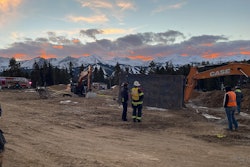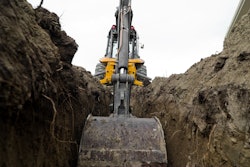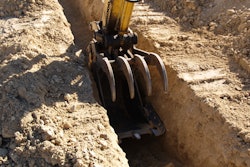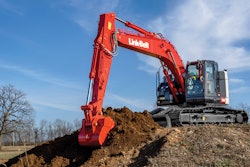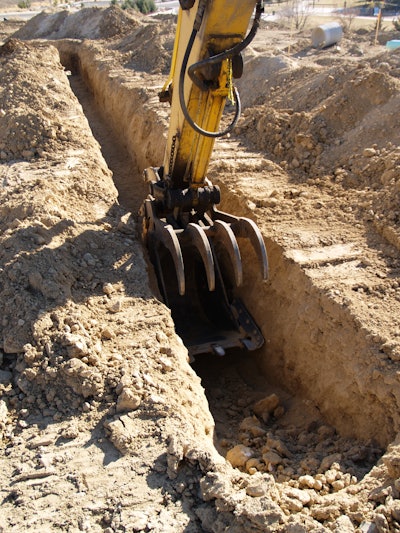
Coming off a year of 35 fatal trench collapses, three contractors face six-figure penalties for trench violations recently issued in Washington, Connecticut and Ohio.
The citations stem from incidents in 2022, which appears to be one of the deadliest years in over a decade for trench collapses. The year’s total was more than double the trench deaths in 2021, according to the U.S. Occupational Safty & Health Administration.
{Related Content: OSHA Reports 35 Trench Deaths in 2022 – More Than Double 2021 Toll}
All three of the recent citations followed worker fatalities – fatalities that investigative agencies say should have been prevented. Two of the contractors are repeat violators, according to OSHA. These contractors face the following proposed penalties:
- AAA Contractors Inc. of Kent, Washington, $437,581.
- Botticello Inc. of Manchester, Connecticut, $375,021.
- Underground Utilities Inc. of Monroeville, Ohio, $251,517.
Worker buried under 10 feet of dirt
On September 7, Surjit Gill, 36, was working in an 18- to 20-foot-deep trench at a new housing development in Renton, Washington, when the walls collapsed and buried him under 10 feet of dirt.
AAA Contractors Inc. of Kent was cited February 14 for three willful, one serious and several general violations. The Washington State Department of Labor & Industries (L&I) issued fines totaling $437,581 and placed AAA in its severe violator program, which means it faces closer scrutiny by the agency. AAA Contractors has filed an appeal.
L&I inspectors found that the trench box used was 4 feet shorter than the top of the trench. There was another trench box at the site that wasn’t being used. If that box had been stacked on top of the other one in the trench, L&I said, “the cave-in might have been prevented.”
Workers in the trench also had no safe way to get out, according to L&I. Two ladder sections were tied together by rope, which is prohibited. The ladder still was not tall enough to meet the requirement of extending 3 feet above the trench opening, and the ladder had damaged side rails and rungs and should not have been used, L&I said.
The trench had also not been inspected before workers entered, and “the shields installed were were inadequate for the soil type and depth,” L&I reports.
The general violations were for not having a person certified in first aid on the site and no documented walk-around safety inspections.
“The requirements are well known by employers in the industry, and effective when followed,” says Craig Blackwood, assistant director for L&I’s Division of Occupational Safety and Health. “Mr. Gill should still be alive today.”
Contractor had previous trench violations
On July 22, Dennis Slater, 56, was in an 8-foot-deep, 135-foot-long trench connecting drainage pipe at a residential development in Vernon, Connecticut, when the walls collapsed. He later died at the hospital.
Slater was a retired 29-year member of the Broad Brook Fire Department and was working at the site for Botticello Inc. of Manchester. According to OSHA, Botticello had been cited for serious violations related to trench work in 2015 in Stafford.
At the July 22 incident, OSHA reports that the vertical walls of the trench had no cave-in protection, the trench was not inspected before workers entered and the closest location to exit the trench was 120 feet away when it should have been no more than 25 feet away.
OSHA cited Botticello Inc. on January 19 for three willful violations and proposed $375,021 in penalties for the July 22 incident and for its prior knowledge from the 2015 citations.
“This deadly cave-in and the worker’s death should never have happened,” said OSHA Area Director Dale Varney in Hartford. “After a previous OSHA inspection, Botticello Inc. knew of the dangers of working in an unprotected trench and the need to inspect the trench and ensure required effective cave-in protection was in place before any employee entered the trench. The company, however, still chose to ignore these required safeguards and now a worker’s family, friends and co-workers are left to grieve.”
Botticello is contesting the penalties.
Contractor cited 6 times since 2017
On July 26, a 33-year-old worker died in a 7.5-foot-deep excavation in Columbus, Ohio, installing hydrant branches after he was pinned between the spreader bars of a trench box and a trench wall.
A sling hook came loose while the box was suspended in the trench, according to OSHA. “Safety latches were missing from the two hooks on the nylon sling used to hoist the trench box.” The employee was climbing onto the end of the spreader bars when the box fell, and the worker was crushed.
That same day and five days before the fatal incident, the worker’s employer, Underground Utilities Inc. of Monroeville, was found by OSHA inspector to have exposed crews to trenching hazards at worksites in Sandusky and Avon Lake, respectively, while replacing municipal water and sewer lines. OSHA adds that, in all, the company has been cited six times for trench-related violations since 2017.
For the fatal incident, Undergroun Utilities was cited for not protecting workers from struck-by hazards, failing to remove the trench box from service when damaged spreader bars were identified, failure to install the trench box so its bottom was within 2 feet from the bottom of the trench, and not providing a safe way to exit the trench. It also failed to report the fatality to OSHA within eight hours as required.
During an inspection at another site in Avon Lake on the same day as the fatality, OSHA found a repeat violation of an improperly installed trench box in a 7-foot trench.
Five days before the death, on July 21, in Sandusky, OSHA inspectors found no safe way to exit a 7-foot trench; trench spoils were piled within 2 feet of the trench’s edge; and there was no adequate cave-in protection.
For all three incidents and the repeat violation, OSHA proposed $251,517 in penalties for Underground Utilities Inc. on January 13.
“A worker’s life was cut short because this employer used faulty equipment,” said OSHA Area Director Larry Johnson in Columbus. “These three investigations at different sites in the same week show Underground Utilities’ lack of concern for employee well-being by failing to follow federal safety regulations and industry-recognized best practices.”
Underground Utilities is contesting the penalties.



